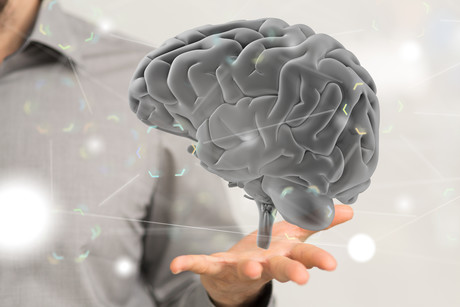Fluid intelligence supported by MD brain regions

New research suggests that the ability to think flexibly and to solve novel problems, known as fluid intelligence, is proposed to depend on a set of frontal and parietal ‘multiple-demand’ (MD) brain regions.
A team of international researchers found that the extent of damage to the MD system predicted fluid intelligence loss after brain injury, whereas damage to the language system did not. Conversely, only damage to the language system predicted performance on a language task, indicating a double dissociation between the two brain systems.
“The MD regions are engaged during many types of cognitive activities. Just adjacent, however, there are brain regions that selectively support language processing. Because of this close proximity, it is possible that the language system is the foundation of complex thought and not the MD regions,” said lead author Dr Alex Woolgar from the Department of Cognitive Science, Macquarie University.
“However, our data from patients with brain injury strongly suggest that language is not at the core of our sophisticated reasoning abilities. Both our language abilities and our intellectual prowess set humans apart from other animals. But, building on prior work that has linked fluid intelligence with frontal and parietal cortices, our paper shows that fluid intelligence is specifically associated with the domain-general MD system, and not the language system. While language may still be important in the development of intellect, these results undermine claims that language is at the core of adult reasoning abilities,” concluded Dr Woolgar.
The study compared brain scans from 80 patients to scans from over 280 healthy individuals. The healthy participants had either performed tasks, such as reading sentences or nonsense words that engaged the language systems, or memory tasks that activated the MD brain regions. This allowed the team to identify how much brain damage had affected the language and MD centres in each of the patients’ brains.
In the future, the team plan to use brain imaging to understand how the MD regions support complex thought.
The study was conducted by researchers from the ARC Centre of Excellence for Cognition and its Disorders (CCD) and Department of Cognitive Science at Macquarie, the MRC Cognition and Brain Science Unit (Cambridge, UK), Harvard Medical School (MA, USA) and Favaloro University (Buenos Aires, Argentina). The findings have been published in Nature Human Behaviour.
Long COVID abnormalities appear to resolve over time
Researchers at UNSW's Kirby Institute have shown that biomarkers in long COVID patients have...
RNA-targeted therapy shows promise for childhood dementia
Scientists have shown that a new RNA-targeted therapy can halt the progression of a specific type...
Parkinson's alters emotion-related bodily sensations
People with Parkinson's disease were found to have significant differences in all bodily...







